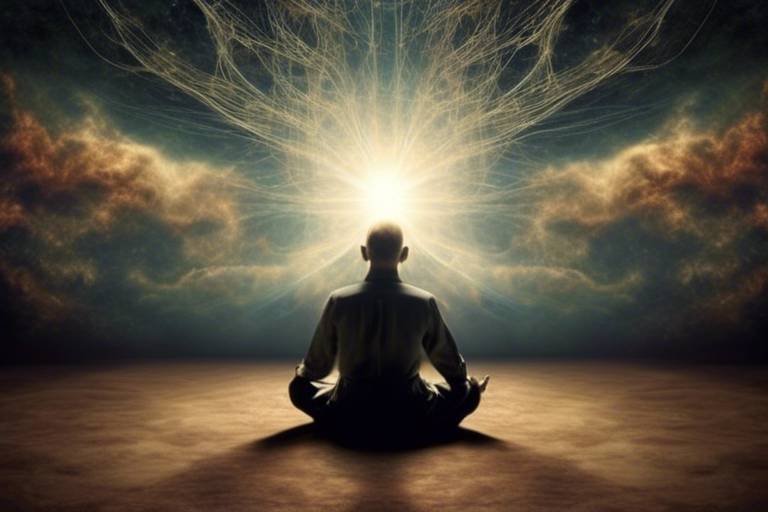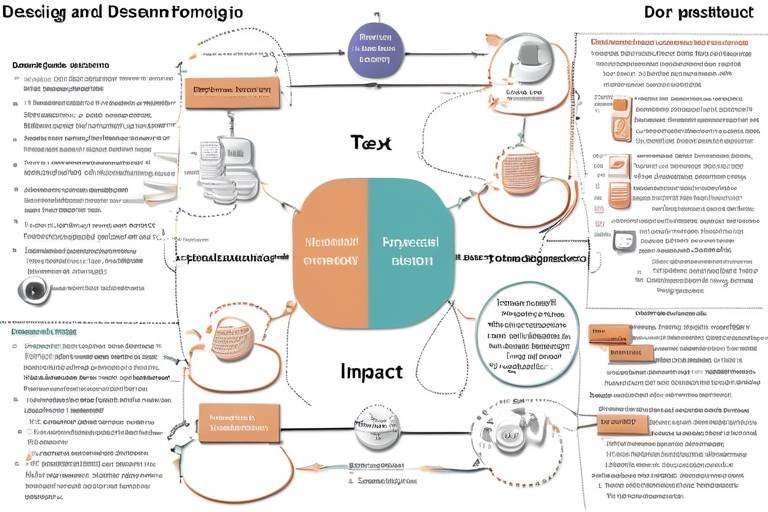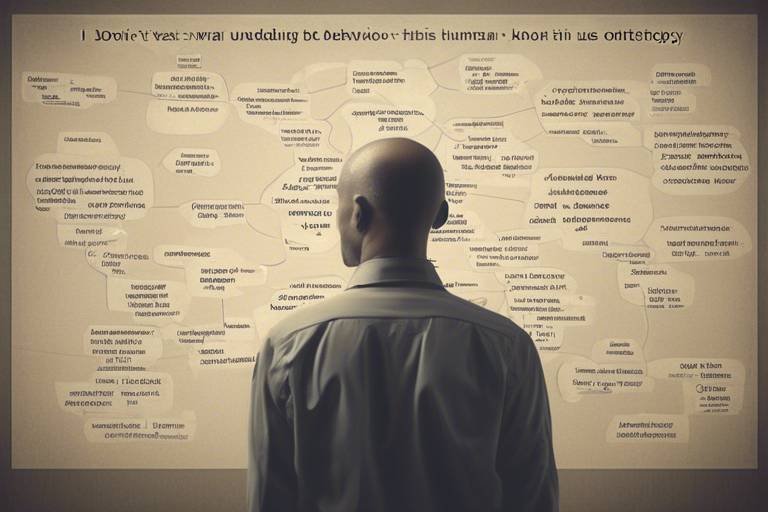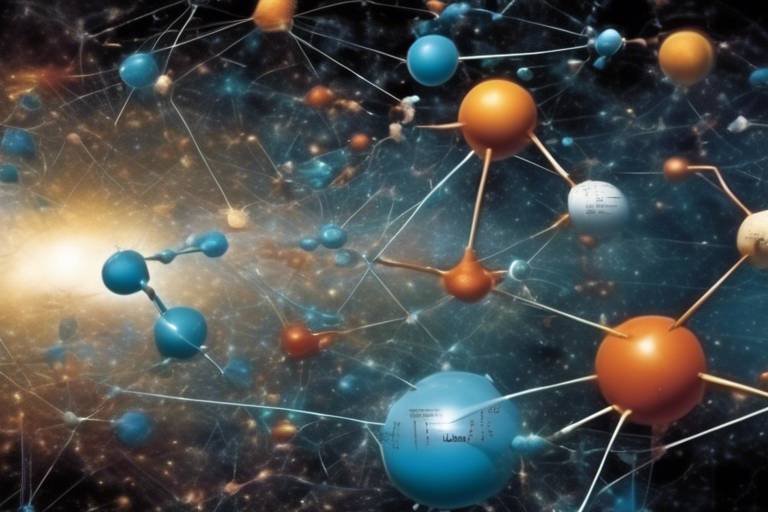Understanding the Metaphysics of Consciousness
The exploration of consciousness is like embarking on a journey through an intricate labyrinth, where every turn reveals new questions and insights about our very existence. At its core, consciousness is not merely a product of biological processes; it is a profound phenomenon that shapes our understanding of reality. This article delves into the intricate relationship between consciousness and metaphysics, exploring various philosophical perspectives, theories, and implications that challenge our conventional views of reality and existence.
Imagine consciousness as the lens through which we perceive the world. It colors our experiences, influences our thoughts, and shapes our interactions. Yet, the question remains: what is consciousness? Is it simply a byproduct of brain activity, or does it possess a deeper, more intrinsic quality? As we navigate through this article, we will uncover the complexities of consciousness, examining its nature, philosophical interpretations, and its significance in both Eastern and Western thought.
As we dive deeper, we will encounter the philosophical perspectives that have shaped our understanding of consciousness. From dualism, which posits a separation between mind and body, to materialism, which argues that consciousness arises solely from physical processes, each viewpoint offers a unique lens through which to interpret our experiences. Additionally, we will explore how consciousness influences our perception of reality, leading us to profound existential questions about the meaning of life and personal identity.
Furthermore, we will examine the insights provided by Eastern philosophies, such as Buddhism and Hinduism, which emphasize the interconnectedness of all beings and the pursuit of enlightenment. These teachings challenge our Western notions of individuality and encourage a broader understanding of consciousness as a universal phenomenon.
Finally, we will touch upon the scientific study of consciousness, investigating how contemporary neuroscience and quantum theories contribute to our understanding of this enigmatic subject. By weaving together philosophical, spiritual, and scientific perspectives, we aim to create a comprehensive picture of consciousness that resonates with both the mind and the spirit.
- What is consciousness? Consciousness refers to the state of being aware of and able to think about one's own existence, thoughts, and surroundings.
- How does consciousness relate to the brain? Neuroscience suggests that consciousness arises from brain activity, but the exact mechanisms remain a topic of ongoing research.
- What are the main philosophical perspectives on consciousness? The main perspectives include dualism, materialism, and idealism, each offering different interpretations of the mind-body relationship.
- How do Eastern philosophies view consciousness? Eastern philosophies often emphasize the interconnectedness of consciousness and the importance of mindfulness and enlightenment.
- Can quantum mechanics explain consciousness? Some theorists propose that quantum mechanics may provide insights into consciousness, suggesting a deeper connection between observation and reality.

The Nature of Consciousness
When we dive into the nature of consciousness, we find ourselves navigating through a complex and often bewildering landscape. Consciousness is not just a passive experience; it is the very fabric of our reality, shaping how we interact with the world around us. Imagine consciousness as a lens through which we perceive everything—our thoughts, emotions, and sensory experiences. This lens is subjective and unique to each individual, making it a fascinating topic of exploration.
At its core, consciousness encompasses our awareness of ourselves and our surroundings. It is the internal dialogue that runs through our minds, the feelings that arise in response to external stimuli, and the memories that color our perceptions. One might wonder, how does this internal experience influence our understanding of reality? Well, consciousness plays a pivotal role in how we interpret events and construct meaning in our lives.
This subjective quality of consciousness is what makes it so intriguing. Consider the following aspects:
- Subjectivity: Each person's consciousness is shaped by their unique experiences, beliefs, and emotions, leading to a rich tapestry of perspectives.
- Intentionality: Consciousness is often directed towards something, whether it be an object, a thought, or an emotion. This focus gives rise to our ability to reflect and analyze.
- Continuity: Our consciousness flows seamlessly from moment to moment, creating a sense of self that persists over time, even as our thoughts and feelings change.
These characteristics raise profound questions about the essence of consciousness. For instance, if our consciousness is so deeply intertwined with our experiences, can it exist independently of the body? This inquiry leads us to ponder the very essence of existence itself. Are we merely biological machines, or is there something more to our being?
Moreover, the nature of consciousness is not just a philosophical puzzle; it has practical implications for our daily lives. Understanding how consciousness operates can lead to greater self-awareness and personal growth. By recognizing the subjective nature of our experiences, we can learn to navigate our emotions and thoughts more effectively. This awareness can foster empathy, as we begin to appreciate that others may perceive the world in ways that are entirely different from our own.
In summary, the nature of consciousness is a profound and multifaceted topic that invites us to reflect on our existence and the world around us. It challenges us to consider not only what it means to be conscious but also how our consciousness shapes our reality. As we continue to explore this intricate relationship, we may uncover deeper insights into the very essence of who we are.
- What is consciousness? Consciousness refers to the state of being aware of and able to think about one's own existence, thoughts, and surroundings.
- How does consciousness affect our perception of reality? Consciousness influences how we interpret sensory information and construct meaning, shaping our understanding of the world.
- Is consciousness separate from the physical body? This is a subject of debate in philosophy, with perspectives ranging from dualism, which posits a separation, to materialism, which argues that consciousness arises from physical processes.
- Can consciousness be measured scientifically? While there are ongoing studies in neuroscience and psychology, consciousness remains a complex phenomenon that is challenging to quantify.

Philosophical Perspectives
When we dive into the realm of consciousness, we quickly realize that it isn't just a straightforward concept; it's a complex tapestry woven from various philosophical threads. Different schools of thought have attempted to dissect the nature of consciousness, leading to a rich dialogue that spans centuries. From the ancient philosophers to modern-day thinkers, the perspectives on consciousness can be broadly categorized into three main frameworks: dualism, materialism, and idealism. Each of these perspectives offers unique insights and raises intriguing questions about our existence and the nature of reality.
Dualism posits that consciousness is separate from the physical body. This perspective has sparked a multitude of debates, particularly surrounding the mind-body problem. If the mind and body are distinct, how do they interact? This question is pivotal in understanding personal identity and the essence of existence beyond mere physicality. Within dualism, we can further differentiate between two types:
- Substance Dualism: This viewpoint asserts that the mind and body are fundamentally different substances. It raises profound questions about how these two interact. If the mind is non-physical, how can it influence physical actions?
- Property Dualism: In contrast, property dualism suggests that mental states are properties of the brain, albeit non-physical in nature. This perspective invites discussions about how mental phenomena relate to physical processes and whether our thoughts can exist independently of our physical state.
On the flip side, we have materialism, which argues that consciousness is a byproduct of physical processes. According to this viewpoint, everything about our conscious experience can be traced back to the workings of the brain. This leads to compelling inquiries about free will and morality. If our thoughts and decisions are merely the result of neural activity, what does that mean for our sense of agency? Materialism challenges us to reconsider the essence of human experience and whether we can genuinely claim ownership over our thoughts and actions.
Lastly, we touch on idealism, which posits that reality is fundamentally mental. In this view, consciousness is the primary substance of existence, and the physical world is a manifestation of mental processes. This perspective flips the script, suggesting that our understanding of reality is not merely shaped by our consciousness but is, in fact, a product of it. Idealism invites us to ponder profound questions about perception and the nature of truth itself.
As we explore these philosophical perspectives, it becomes clear that our understanding of consciousness is not merely an academic exercise. It has profound implications for how we perceive reality, our moral frameworks, and even our existential queries. The interplay between these perspectives creates a rich dialogue that continues to evolve, challenging us to think critically about the nature of our own consciousness.
- What is dualism? Dualism is the philosophical viewpoint that posits the mind and body are distinct entities, leading to discussions about their interaction.
- How does materialism view consciousness? Materialism argues that consciousness arises solely from physical processes, suggesting that all mental states are reducible to brain activity.
- What is idealism? Idealism posits that reality is fundamentally mental, asserting that consciousness shapes the physical world rather than the other way around.
- Why is the study of consciousness important? Understanding consciousness has profound implications for knowledge, ethics, and our understanding of existence itself.

Dualism
Dualism is a fascinating philosophical perspective that posits the existence of two distinct realms: the mental and the physical. This view challenges us to consider the complexities of the mind-body relationship, raising significant questions about how these two entities interact. Imagine for a moment that your mind is like a software program, while your body represents the hardware. Just as software can exist independently of the physical machine, dualism suggests that consciousness can exist apart from the physical body. This leads us to ponder: if the mind and body are separate, what does that mean for our understanding of existence and identity?
At the heart of dualism lies the mind-body problem, which grapples with how these two distinct substances interact. For instance, how can a thought, which is non-physical, cause a physical action, like raising your hand? This interaction raises profound implications for our understanding of personal identity and existence. If our consciousness can exist independently, what happens to our sense of self when our physical body ceases to function? Are we merely biological machines, or is there something more profound that defines our existence?
There are two primary branches of dualism that further elaborate on this relationship: substance dualism and property dualism. Substance dualism asserts that the mind and body are fundamentally different substances, each with its own essence. This perspective invites a myriad of questions about how these substances interact, suggesting that perhaps our mental states influence our physical states in ways that are not yet fully understood.
On the other hand, property dualism takes a slightly different approach. Instead of positing two distinct substances, it suggests that mental states are non-physical properties of the brain. This perspective allows for a more integrated view of consciousness, where mental phenomena emerge from physical processes but are not reducible to them. Think of it like a musical performance: while the instruments (the brain) are crucial, the music (consciousness) cannot be fully explained by the instruments alone. This invites a deeper exploration into the nature of mental phenomena and their relationship to physical processes, leading us to ask: can we ever truly understand consciousness if we only focus on the physical aspects of the brain?
In summary, dualism opens up a rich dialogue about the nature of consciousness and existence. It encourages us to explore the profound questions surrounding our identity, the interaction between mind and body, and the very essence of what it means to be human. As we delve deeper into this philosophical framework, we uncover the layers of complexity that define our understanding of reality itself.
- What is dualism? Dualism is a philosophical perspective that posits the existence of two distinct realms: the mental and the physical.
- What is the mind-body problem? The mind-body problem addresses how the mental and physical substances interact, raising questions about consciousness and existence.
- What are the two types of dualism? The two primary types of dualism are substance dualism, which posits that the mind and body are distinct substances, and property dualism, which suggests that mental states are non-physical properties of the brain.

Substance Dualism
Substance dualism is a fascinating philosophical perspective that argues for the existence of two fundamentally different substances: the mind and the body. This viewpoint suggests that the mind, which encompasses our thoughts, feelings, and consciousness, is a distinct entity separate from the physical body. Imagine for a moment that your mind is like a software program running on a computer. The computer itself is the body, while the software represents your thoughts and consciousness. This analogy highlights how substance dualism posits that while the body can be seen as a physical machine, the mind operates independently of it.
One of the most significant implications of substance dualism is the intricate nature of the mind-body relationship. Questions arise such as: How do these two distinct substances interact? Can the mind influence the body, and vice versa? These inquiries lead to what is famously known as the "mind-body problem." Philosophers have debated this issue for centuries, with some suggesting that the mind can affect physical processes (like how a thought can lead to a physical action), while others argue that the body’s physical state can influence mental states (like how physical pain can lead to emotional distress).
Moreover, substance dualism raises profound questions about personal identity. If the mind is separate from the body, what happens to our consciousness when the body ceases to function? This line of thinking opens up discussions about the possibility of an afterlife or the persistence of the self beyond physical existence. Many dualists argue that our identity is tied to our consciousness, suggesting that even if the body dies, the mind may continue to exist in some form.
To further illustrate the principles of substance dualism, consider the following table that summarizes its key features:
| Feature | Description |
|---|---|
| Nature of Substances | Two distinct substances: the mind (non-physical) and the body (physical). |
| Mind-Body Interaction | Debates on how the mind and body influence each other. |
| Personal Identity | Explores the implications for identity and existence after death. |
In conclusion, substance dualism offers a compelling framework for understanding the complexities of consciousness and existence. By asserting the independence of the mind from the body, it invites us to ponder the nature of reality, identity, and the potential for life beyond our physical form. It's a rich field of inquiry that continues to inspire philosophical debate and scientific exploration.
- What is substance dualism? Substance dualism is the philosophical idea that the mind and body are two distinct substances that interact with each other.
- How does substance dualism explain personal identity? It suggests that our identity is tied to our consciousness, which may persist even after the physical body dies.
- What are the implications of substance dualism for the afterlife? It raises questions about the possibility of an existence beyond physical death, as the mind is seen as separate from the body.

Property Dualism
Property dualism presents a fascinating perspective on the relationship between the mind and body, suggesting that while both are interconnected, they possess distinct properties. Unlike substance dualism, which argues that the mind and body are separate entities, property dualism asserts that mental states are non-physical properties of physical substances, particularly the brain. This concept invites us to ponder the intricate dance between our thoughts and the biological processes that underpin them.
Imagine for a moment that your brain is like a complex orchestra, with each neuron acting as a musician playing its part. The music they create—your thoughts, feelings, and consciousness—is a product of their interactions, yet it transcends any single note or instrument. In this analogy, the music represents the mental states that arise from the physical structure of the brain. Property dualism emphasizes that while the orchestra (the brain) is essential for producing the music (consciousness), the music itself is something unique and not reducible to the individual notes.
This perspective raises several intriguing questions about the nature of mental phenomena. For instance, how do we account for subjective experiences, like the sensation of pain or the feeling of joy? Property dualists argue that these experiences cannot be entirely explained by physical processes alone. They suggest that mental properties have unique qualities that influence our behavior and perceptions, creating a rich tapestry of human experience that cannot simply be quantified or reduced to brain activity.
Moreover, property dualism opens the door to discussions about the implications of consciousness on personal identity. If our thoughts and feelings are properties of the brain, what happens to our sense of self when those properties change? Consider how a traumatic event might alter someone's personality or how a certain medication can impact mood. These shifts highlight the dynamic nature of consciousness and challenge the notion of a fixed identity.
In summary, property dualism offers a compelling framework for understanding the complexities of consciousness. It acknowledges the physical basis of mental states while also recognizing their distinct qualities. This duality not only enriches our understanding of the mind-body relationship but also invites us to explore the profound implications for our understanding of existence and personal identity.
- What is property dualism? Property dualism is the philosophical view that mental states are non-physical properties of the brain, suggesting a distinction between physical processes and conscious experiences.
- How does property dualism differ from substance dualism? While substance dualism posits that the mind and body are separate entities, property dualism maintains that they are interconnected, with mental states being properties of physical substances.
- What are the implications of property dualism for personal identity? Property dualism raises questions about how changes in mental states can affect our sense of self, emphasizing the dynamic nature of consciousness.

Materialism
Materialism is a fascinating philosophical stance that asserts that everything we experience, including our thoughts and consciousness, is fundamentally rooted in the physical realm. This perspective suggests that consciousness is not a separate entity but rather an emergent property of complex physical processes occurring within our brains. Imagine consciousness as a vibrant tapestry woven from the threads of our neural activity; each thread represents a different physical process, and together they create the rich fabric of our subjective experience. This viewpoint raises some intriguing questions: If consciousness is merely a byproduct of physical interactions, what does that mean for our understanding of free will, morality, and the essence of what it means to be human?
One of the key implications of materialism is the challenge it poses to traditional notions of free will. If our thoughts and decisions are simply the result of chemical reactions and electrical impulses in the brain, can we truly claim to have control over our actions? This leads to a profound inquiry into the nature of responsibility and accountability. Are we merely puppets of our biology, or is there a deeper layer of agency that transcends mere physicality? These questions ignite passionate debates among philosophers, scientists, and ethicists alike.
Moreover, materialism invites us to reconsider the nature of morality. If our moral judgments are derived from evolutionary processes and social conditioning, do they hold the same weight as those grounded in a more metaphysical or spiritual framework? This perspective can be both liberating and daunting. On one hand, it emphasizes the importance of understanding human behavior through the lens of science, encouraging empathy and compassion based on shared biological experiences. On the other hand, it raises concerns about the potential for nihilism—the idea that without a higher purpose, life lacks intrinsic meaning.
As we delve deeper into the materialist viewpoint, it becomes essential to examine the relationship between consciousness and the brain. Neuroscience has made significant strides in mapping the brain's functions, revealing how different areas are activated during various cognitive tasks. For example, researchers have identified regions responsible for decision-making, emotions, and memory. This growing body of evidence supports the materialist claim that consciousness arises from physical processes. However, it also leads to further questions: Can we reduce the richness of human experience to mere brain activity? Are there aspects of consciousness that remain elusive to scientific inquiry?
In conclusion, materialism offers a compelling framework for understanding consciousness, but it also opens the door to challenging philosophical dilemmas. As we navigate the complexities of our existence, we must grapple with the implications of this perspective and what it means for our understanding of reality. The interplay between consciousness and the physical world continues to inspire inquiry and debate, reminding us that the quest for knowledge is as dynamic and intricate as the very fabric of consciousness itself.
- What is materialism? Materialism is the philosophical view that everything, including consciousness, is derived from physical processes.
- How does materialism affect our understanding of free will? Materialism raises questions about the nature of free will, suggesting that our thoughts and actions may be determined by biological processes.
- Can consciousness be fully explained by neuroscience? While neuroscience provides valuable insights, some aspects of consciousness may remain unexplained, leading to ongoing debates.
- What are the implications of materialism for morality? Materialism challenges traditional moral frameworks, suggesting that our moral judgments may be influenced by evolutionary and social factors.

Consciousness and Reality
Have you ever pondered how your consciousness shapes your perception of reality? It's a fascinating question that dives deep into the intricate relationship between our minds and the world around us. Our consciousness acts as a lens through which we interpret sensory information, construct meaning, and ultimately navigate our existence. This subjective experience is unique to each individual, making it a rich subject for exploration.
At its core, consciousness influences not just how we perceive reality, but also how we interpret it. For instance, two people can witness the same event yet come away with vastly different interpretations. This phenomenon can be attributed to their personal experiences, beliefs, and emotional states. It raises the question: is there an objective reality, or is everything we perceive merely a construct of our consciousness? This debate has profound implications for our understanding of knowledge and truth.
Moreover, the relationship between consciousness and reality invites us to consider the existential implications of our perceptions. If our understanding of reality is shaped by our consciousness, what does that mean for concepts like truth and meaning? Are they absolute, or are they fluid constructs that change with our perceptions? This exploration can lead to a deeper understanding of our personal identities and the essence of existence itself.
To illustrate this point further, let’s consider an example. Imagine walking through a bustling market. Your consciousness picks up on the vibrant colors, the sounds of vendors shouting, and the smell of spices wafting through the air. However, while you are immersed in this sensory experience, another person might be lost in their thoughts, barely aware of their surroundings. This divergence highlights how consciousness can alter our reality. It’s as if we each inhabit our own universe, shaped by our thoughts, feelings, and perceptions.
In addition, the implications of consciousness extend beyond individual experiences to broader societal contexts. For example, collective consciousness can influence cultural norms and values. When a community shares a common understanding or belief, it can shape their reality in profound ways. This shared consciousness can lead to movements, revolutions, and even shifts in moral frameworks. Understanding this interconnectedness can empower us to foster empathy and connection in a world that often feels divided.
Ultimately, the exploration of consciousness and reality is an ongoing journey. It challenges us to question our perceptions, to seek understanding beyond our immediate experiences, and to recognize the profound impact our consciousness has on the world around us. As we continue to delve into this intricate relationship, we may uncover new insights that not only enrich our understanding of existence but also illuminate the path toward greater self-awareness and enlightenment.
- What is the relationship between consciousness and perception?
Consciousness shapes our perception by acting as a filter through which we interpret sensory information, leading to unique individual experiences. - Can consciousness exist independently of the physical body?
This is a debated topic in philosophy, particularly in dualism, which posits that consciousness can exist separately from the physical body. - How does collective consciousness impact society?
Collective consciousness can influence cultural norms, values, and movements, highlighting the interconnectedness of individual experiences.

Perception and Interpretation
Perception is a fascinating dance between our consciousness and the world around us. It’s like wearing a pair of glasses that tint everything we see. Each moment, our mind is actively engaged in interpreting sensory information, crafting a unique narrative that shapes our understanding of reality. Have you ever noticed how two people can witness the same event yet walk away with entirely different stories? This phenomenon speaks volumes about the subjective nature of perception.
At its core, perception is not just about passively receiving information; it’s an active process. Our brain takes in stimuli through our senses—sight, sound, touch, taste, and smell—and then processes this information based on our past experiences, beliefs, and cultural influences. For example, consider how a piece of music can evoke different emotions in different listeners. One person might find a song uplifting, while another might feel a sense of melancholy. This variance highlights how our individual consciousness plays a pivotal role in interpreting the world.
Moreover, perception is influenced by a myriad of factors, including:
- Emotional State: Our feelings can color our perceptions. When we are happy, we tend to see the world in a more positive light.
- Cultural Background: Different cultures may interpret symbols and gestures uniquely, leading to varying perceptions of the same event.
- Expectations: What we expect to see can significantly influence what we actually perceive. This is often referred to as a cognitive bias.
Neuroscience has made strides in exploring how our brain processes perception. For instance, studies show that our brain constructs a model of the world based on incoming sensory data, constantly updating this model as we gather more information. This model is not a perfect representation of reality; rather, it’s a subjective interpretation shaped by our consciousness. It’s akin to an artist painting a landscape—not every detail is captured, and the final piece reflects the artist's unique perspective.
In essence, the interplay between perception and interpretation is a dynamic process that underscores the complexity of consciousness. It raises intriguing questions about the nature of reality itself: Is what we perceive the true essence of the world, or merely a reflection of our consciousness? The answer is likely not black and white, but rather a spectrum of interpretations, each valid in its own right. This realization invites us to be more mindful of our perceptions, encouraging us to consider alternative viewpoints and embrace the rich tapestry of human experience.
- What is the difference between perception and sensation?
Sensation refers to the initial detection of stimuli through our senses, while perception is the interpretation of those sensations, influenced by our experiences and context.
- Can perception be altered?
Yes, perception can be altered through various factors such as emotional state, expectations, and cultural influences. Techniques like mindfulness can also help shift perceptions.
- How does consciousness affect perception?
Consciousness acts as a filter through which we interpret sensory information. It shapes our understanding and response to the world based on our unique experiences and beliefs.

Existential Implications
When we dive into the intricate relationship between consciousness and reality, we inevitably stumble upon profound existential implications that challenge our very understanding of existence. Have you ever pondered the meaning of life or questioned your own identity? These are not just casual musings; they are the core of what it means to be conscious. The way we perceive our existence is heavily influenced by our consciousness, shaping our beliefs, values, and ultimately, our actions.
Existentialism, a philosophical movement that focuses on individual existence and freedom, resonates deeply with the exploration of consciousness. It posits that we are not merely products of our environment or biological makeup; instead, we are active participants in crafting our own reality. This notion can be liberating yet daunting. The freedom to define our existence comes with the weight of responsibility. We must ask ourselves: What do we want our lives to mean? What legacy do we wish to leave behind? These questions are not just philosophical inquiries; they are essential to our journey of self-discovery.
Moreover, the relationship between consciousness and reality brings forth the idea of personal identity. Who are we beyond our memories, experiences, and the roles we play in society? Our consciousness is a continuous thread that weaves through the fabric of our lives, connecting past, present, and future. It is this thread that gives us a sense of continuity, yet it also raises questions about the nature of change. As we evolve, do we remain the same person? This tension between continuity and change is at the heart of existential thought.
To further illustrate these existential implications, consider the following points:
- Meaning and Purpose: The quest for meaning is a fundamental aspect of human existence. Our consciousness drives us to seek purpose, whether through relationships, work, or personal growth.
- Freedom and Responsibility: With the recognition of our ability to shape our reality comes the acknowledgment of our responsibility to make choices that align with our values and beliefs.
- Identity and Change: The fluid nature of consciousness prompts us to examine how our identities are formed and transformed over time, challenging the notion of a fixed self.
As we navigate these existential waters, it becomes clear that our understanding of consciousness is not just an academic exercise; it is a deeply personal journey. The implications stretch far beyond philosophical debates, touching the very essence of what it means to be human. In a world filled with uncertainty, our consciousness serves as both a compass and a mirror, guiding us through the complexities of existence while reflecting our innermost thoughts and feelings.
Ultimately, the exploration of consciousness and its existential implications invites us to engage in a dialogue with ourselves and the world around us. It challenges us to confront uncomfortable truths and embrace the mystery of our existence. So, the next time you find yourself lost in thought, remember that these moments of reflection are not just fleeting; they are the building blocks of your consciousness, shaping your reality and your understanding of life itself.
- What is the relationship between consciousness and reality?
Consciousness shapes our perception of reality, influencing how we interpret our experiences and understand the world around us. - How does consciousness affect personal identity?
Consciousness provides a continuous sense of self, even as we change over time, prompting questions about who we are at our core. - What are the existential implications of consciousness?
Consciousness raises questions about meaning, purpose, freedom, and responsibility, challenging us to reflect on our existence and choices.

Consciousness in Eastern Philosophy
Eastern philosophies, particularly Buddhism and Hinduism, provide profound insights into the nature of consciousness that diverge significantly from Western thought. In these traditions, consciousness is not merely a byproduct of physical processes but is often seen as a fundamental aspect of existence itself. This perspective emphasizes the interconnectedness of all beings, suggesting that our individual consciousness is part of a larger, unified whole. Such an understanding invites us to explore the deeper implications of our existence and our relationship with the universe.
In Buddhism, consciousness is viewed as impermanent and constantly changing. The teachings emphasize the importance of mindfulness, urging individuals to become aware of their thoughts and feelings without attachment. This practice not only fosters a greater understanding of the self but also aids in the cessation of suffering. By recognizing the transient nature of consciousness, practitioners can learn to let go of desires and fears that bind them, ultimately leading to a state of enlightenment. The Buddhist perspective challenges us to ask: if consciousness is ever-changing, what does that mean for our sense of self?
Hindu philosophy offers a different yet complementary view. Here, consciousness is often described through the concepts of Atman and Brahman. Atman refers to the individual soul, while Brahman denotes the universal consciousness that pervades all existence. This relationship illustrates that while we may perceive ourselves as separate entities, we are, in essence, part of a greater reality. This interconnectedness raises intriguing questions about personal identity and the nature of existence. How do our individual experiences contribute to the universal tapestry of consciousness?
Both traditions encourage a deep exploration of consciousness, urging individuals to look beyond the surface of their experiences. This exploration can lead to significant existential insights, prompting questions like:
- What is the role of consciousness in shaping our reality?
- How does the understanding of interconnectedness influence our moral and ethical decisions?
- In what ways can mindfulness practices transform our perception of consciousness?
Ultimately, the study of consciousness in Eastern philosophy invites us to engage in a journey of self-discovery, challenging us to redefine our understanding of existence. By embracing these teachings, we can cultivate a richer, more meaningful experience of life, one that transcends the boundaries of individual perception and taps into the universal flow of consciousness.
Q: How does Eastern philosophy view consciousness compared to Western philosophy?
A: Eastern philosophy often sees consciousness as interconnected and fundamental to existence, while Western philosophy tends to focus on the mind-body relationship and the material aspects of consciousness.
Q: What role does mindfulness play in understanding consciousness in Buddhism?
A: Mindfulness is crucial in Buddhism as it helps individuals become aware of their thoughts and feelings, leading to a deeper understanding of the transient nature of consciousness and the cessation of suffering.
Q: Can the concepts of Atman and Brahman be applied in modern life?
A: Yes, these concepts encourage individuals to recognize their connection to the universe, fostering a sense of unity and purpose that can enhance personal and spiritual growth.

Buddhist Perspectives
Buddhism offers a profound and nuanced understanding of consciousness, one that is deeply interwoven with the concepts of impermanence and interconnectedness. According to Buddhist teachings, consciousness is not a static entity; rather, it is a dynamic process that is constantly changing. This perspective challenges the conventional notion of a fixed self, emphasizing that what we perceive as 'I' is merely a collection of fleeting experiences and thoughts. Imagine a river—just like the water flows and changes, so does our consciousness, shaped by our experiences and interactions.
One of the core tenets of Buddhism is the idea of mindfulness. Practicing mindfulness allows individuals to become aware of their thoughts and feelings in the present moment, fostering a deeper understanding of the nature of consciousness itself. This practice encourages people to observe their mental states without attachment, leading to the realization that many of our thoughts are transient and do not define who we are. In this way, mindfulness becomes a tool for liberation from suffering, as it helps individuals to break free from the cycles of craving and aversion that often lead to distress.
Moreover, Buddhism teaches that the cessation of suffering is achievable through understanding the nature of consciousness. The Four Noble Truths outline this path, emphasizing that by recognizing the impermanent nature of our thoughts and emotions, we can cultivate a sense of peace and equanimity. This is where the concept of anatta, or non-self, plays a critical role. It suggests that the self is an illusion, a construct of our minds shaped by experiences, desires, and societal influences. By letting go of this illusion, one can attain a state of enlightenment, or Nirvana, which is characterized by profound peace and the cessation of suffering.
In Buddhist philosophy, there is also a strong emphasis on the interconnectedness of all beings. This perspective posits that our consciousness does not exist in isolation; rather, it is intricately linked to the consciousness of others and the universe itself. This interconnectedness fosters a sense of compassion and empathy, as recognizing the shared nature of consciousness encourages individuals to act with kindness towards others. The idea of dependent origination illustrates this point, showing how all phenomena arise in dependence upon conditions, further emphasizing the relational aspect of consciousness.
To summarize, Buddhist perspectives on consciousness invite us to explore the depths of our minds and the nature of our existence. Through practices such as mindfulness, individuals can gain insight into the impermanent and interconnected nature of consciousness, leading to a more profound understanding of life and the alleviation of suffering. In this light, consciousness is not merely a personal experience but a shared journey toward enlightenment and compassion.

Hindu Concepts
In Hindu philosophy, consciousness is not merely an attribute of the individual; it is a fundamental aspect of the universe. This perspective is beautifully encapsulated in the concepts of Atman and Brahman, which represent the individual self and the universal consciousness, respectively. Atman is often described as the true essence of an individual, the part of us that is eternal and unchanging, while Brahman is the ultimate reality, the cosmic spirit that pervades everything. This relationship between Atman and Brahman illustrates a profound interconnectedness, suggesting that each person's consciousness is a reflection of a greater, universal consciousness.
The journey of understanding consciousness in Hinduism is akin to peeling an onion—layer upon layer reveals deeper truths. The idea of Maya, or illusion, plays a crucial role here, indicating that our perceptions of separateness and individuality are misleading. Just as a mirage can deceive the thirsty traveler, our everyday experiences can obscure the truth of our unity with the universe. The ultimate goal in Hindu philosophy is to realize this unity, transcending the illusion of duality to experience the oneness of Atman and Brahman.
Moreover, the practice of meditation and yoga is central to this exploration of consciousness. These disciplines are not just physical exercises; they are pathways to deeper awareness and understanding. Through meditation, practitioners seek to quiet the mind and connect with their true self, fostering a direct experience of consciousness that transcends ordinary thought. This journey is often described in various texts, such as the Upanishads, which delve into the nature of reality and the self.
To further illustrate the relationship between Atman and Brahman, consider the following table:
| Concept | Description |
|---|---|
| Atman | The individual self, the true essence that is eternal and unchanging. |
| Brahman | The ultimate reality, the all-encompassing cosmic spirit that connects all beings. |
| Maya | The illusion of separateness and individuality that obscures the truth of unity. |
| Meditation | A practice aimed at quieting the mind to connect with the true self and universal consciousness. |
In conclusion, Hindu concepts of consciousness offer a rich tapestry of ideas that encourage individuals to look beyond the surface of their existence. By understanding the interplay between Atman and Brahman, and by engaging in practices that promote self-awareness, one can embark on a transformative journey toward enlightenment. This journey is not just about understanding consciousness; it is about experiencing the profound truth of our interconnectedness with all of existence.
- What is Atman in Hindu philosophy?
Atman refers to the individual self or soul, which is considered eternal and unchanging. - How does Brahman relate to Atman?
Brahman is the ultimate reality that pervades the universe, and Atman is seen as a reflection of this universal consciousness. - What role does meditation play in understanding consciousness?
Meditation is a practice that helps individuals quiet their minds and connect with their true selves, facilitating a deeper understanding of consciousness. - What is Maya in Hinduism?
Maya refers to the illusion of separateness and individuality that distracts us from recognizing our unity with the universe.

The Scientific Study of Consciousness
In recent years, the scientific study of consciousness has gained significant traction, leading to fascinating insights and debates across various disciplines. Neuroscience, psychology, and even quantum physics are all contributing to our understanding of this complex phenomenon. But what exactly does it mean to study consciousness scientifically? Essentially, it involves examining how conscious experiences arise from brain activity, the underlying mechanisms that enable perception, and the intricate relationship between the mind and the body.
Neuroscience plays a pivotal role in this exploration. By using advanced imaging techniques like fMRI and EEG, researchers can observe brain activity in real-time, enabling them to identify which areas of the brain are involved in specific conscious experiences. For instance, studies have shown that different types of stimuli—visual, auditory, or tactile—activate distinct neural pathways. This raises intriguing questions about how these neural processes translate into subjective experiences. Are our perceptions merely byproducts of brain activity, or is there something more profound at play?
Moreover, the field of psychology complements neuroscience by investigating how consciousness shapes behavior and cognition. Cognitive psychology, for example, looks at how our thoughts and perceptions influence our actions. One of the key areas of interest is the concept of self-awareness. How do we become conscious of our own existence? What role does memory play in shaping our self-perception? These questions are not just academic; they have real-world implications for mental health, personal identity, and even social interactions.
Interestingly, some scientists are even delving into the realm of quantum theories to explain consciousness. While this may sound like science fiction, proponents argue that quantum mechanics could provide insights into the nature of reality itself. They suggest that consciousness might be intertwined with quantum processes, implying that our understanding of reality could be fundamentally altered by our conscious observations. This idea challenges the traditional notions of materialism, suggesting a more interconnected view of consciousness and the universe.
To summarize, the scientific study of consciousness is a multi-faceted endeavor that encompasses various fields and perspectives. It raises profound questions about the essence of human experience and the nature of reality. As we continue to explore this enigmatic subject, we may find that the answers not only illuminate our understanding of consciousness but also redefine what it means to be human.
- What is consciousness? Consciousness refers to the state of being aware of and able to think and perceive one's surroundings, thoughts, and emotions.
- How do scientists study consciousness? Scientists study consciousness using techniques from neuroscience, psychology, and quantum physics, employing tools like fMRI and EEG to observe brain activity.
- What is the relationship between consciousness and the brain? Research suggests that consciousness arises from neural activity in the brain, although the exact mechanisms remain a topic of ongoing investigation.
- Can consciousness exist independently of the body? This is a debated topic in philosophy and science, with some theories suggesting that consciousness may have non-physical aspects.

Neuroscience and Consciousness
When we dive into the fascinating realm of neuroscience, we’re stepping into a world filled with intricate neural networks and the mysteries of the brain. Neuroscience seeks to unravel the complex relationship between brain activity and our conscious experiences. Imagine your brain as a bustling city, where each neuron is a streetlight, flickering on and off, guiding the flow of information. This city is constantly alive, responding to stimuli, processing thoughts, and generating emotions. But how does this bustling activity translate into the rich tapestry of our conscious experience?
At the heart of neuroscience is the quest to understand how the brain produces consciousness. Researchers utilize advanced imaging techniques, such as fMRI (functional Magnetic Resonance Imaging) and EEG (Electroencephalography), to observe brain activity in real-time. These tools allow scientists to see which areas of the brain light up during different cognitive tasks, revealing a remarkable correlation between specific neural patterns and conscious experiences. For instance, when you engage in a complex problem-solving task, certain regions of your prefrontal cortex become highly active, indicating a surge in conscious thought and decision-making.
However, the relationship between consciousness and neural activity isn’t as straightforward as it may seem. One of the intriguing questions that arise is whether consciousness is merely a byproduct of brain processes or if it plays a more active role in shaping our reality. Some scientists argue for a model known as emergentism, where consciousness emerges from the intricate interactions of neurons, suggesting that it is a fundamental aspect of our cognitive architecture. Others propose that consciousness might influence our neural pathways, creating a feedback loop where thoughts can affect brain function.
To further illustrate this relationship, consider the following table summarizing key aspects of neuroscience and consciousness:
| Aspect | Description |
|---|---|
| Neural Correlates | Specific brain regions associated with conscious experiences. |
| Brain Imaging | Techniques like fMRI and EEG used to study brain activity. |
| Emergentism | The idea that consciousness emerges from complex neural interactions. |
| Feedback Loop | The interaction between consciousness and brain function. |
As we peel back the layers of this complex relationship, we also encounter profound implications for our understanding of free will and personal identity. If our conscious thoughts are merely the result of neural processes, what does that mean for our sense of agency? Are we truly the authors of our actions, or are we simply following the script written by our brain's wiring?
Moreover, the study of consciousness in neuroscience opens the door to various philosophical inquiries. For instance, consider the concept of qualia, the subjective quality of experiences. How do we account for the unique way each individual perceives the color red or the taste of chocolate? These personal experiences challenge the objective measurements of brain activity, suggesting that there’s more to consciousness than what can be quantified.
In conclusion, the intersection of neuroscience and consciousness is a captivating field filled with questions that challenge our understanding of reality. As we continue to explore the brain's mysteries, we inch closer to unraveling the enigma of consciousness itself, ultimately leading us to ponder the very nature of existence.
- What is the primary focus of neuroscience in relation to consciousness? Neuroscience primarily focuses on understanding how brain activity correlates with conscious experiences and how these interactions shape our perceptions and behaviors.
- How do fMRI and EEG contribute to consciousness studies? fMRI and EEG are essential tools that allow researchers to visualize brain activity in real-time, helping to identify which brain regions are involved in various conscious processes.
- What are the implications of emergentism in understanding consciousness? Emergentism suggests that consciousness arises from complex neural interactions, which raises questions about the nature of free will and personal identity.
- What role do subjective experiences play in the study of consciousness? Subjective experiences, or qualia, highlight the complexities of consciousness, emphasizing that personal perceptions cannot be fully captured by objective measurements alone.

Quantum Theories
Quantum theories present a fascinating lens through which we can examine the intricate relationship between consciousness and the fundamental nature of reality. At its core, quantum mechanics challenges our conventional understanding of the universe, suggesting that the act of observation plays a pivotal role in shaping the very fabric of existence. Imagine standing in front of a painting; your perception and interpretation of the artwork can alter its meaning, much like how consciousness interacts with the quantum realm.
One of the most intriguing aspects of quantum theories is the concept of superposition. This principle posits that particles can exist in multiple states simultaneously until they are observed or measured. This phenomenon raises profound questions: Does consciousness itself act as the observer that collapses these potential states into a single reality? Some theorists argue that consciousness may not merely be a byproduct of physical processes but rather a fundamental component that influences the behavior of particles at the quantum level.
Additionally, the idea of entanglement further complicates our understanding of consciousness. When particles become entangled, the state of one particle instantly affects the state of another, regardless of the distance separating them. This interconnectedness hints at a deeper, perhaps metaphysical, relationship between all entities in the universe. Could it be that consciousness, too, is entangled with the cosmos, suggesting a shared experience that transcends individual existence?
To illustrate these concepts, consider the following table that summarizes key quantum principles and their implications for consciousness:
| Quantum Principle | Description | Implication for Consciousness |
|---|---|---|
| Superposition | Particles exist in multiple states until observed. | Consciousness may influence the collapse of potential realities. |
| Entanglement | Particles remain connected regardless of distance. | Suggests a universal interconnectedness of consciousness. |
| Observer Effect | The act of measurement affects the state of a system. | Highlights the role of consciousness in shaping reality. |
These quantum principles not only challenge our scientific understanding but also invite philosophical inquiry into the nature of existence and consciousness. As we delve deeper into these theories, we find ourselves at the crossroads of science and spirituality, where the lines between the observer and the observed blur. The implications of quantum theories extend beyond mere academic exploration; they beckon us to reconsider our place in the universe and the profound mysteries that consciousness encompasses.
- What is the observer effect in quantum mechanics?
The observer effect refers to changes that the act of observation can make on a phenomenon being observed. In quantum mechanics, this means that measuring a particle can change its state.
- How does consciousness relate to quantum mechanics?
Some theories suggest that consciousness may play a role in collapsing quantum states, indicating that our awareness could influence the fundamental nature of reality.
- What is superposition in quantum theory?
Superposition is a principle stating that a quantum system can exist in multiple states at once until it is measured, at which point it 'collapses' into one of the possible states.
- What does entanglement mean?
Entanglement is a phenomenon where particles become interconnected in such a way that the state of one particle can instantaneously affect the state of another, regardless of the distance separating them.
Frequently Asked Questions
- What is consciousness?
Consciousness is the state of being aware of and able to think about one's own existence and surroundings. It's like the spotlight of our mind, illuminating thoughts, feelings, and perceptions, allowing us to experience life in a deeply personal way.
- How does consciousness relate to metaphysics?
Consciousness and metaphysics are intertwined as metaphysics explores the fundamental nature of reality, including existence and the relationship between mind and matter. Think of metaphysics as the map and consciousness as the traveler navigating through the landscape of reality.
- What are the main philosophical perspectives on consciousness?
There are several key perspectives, including dualism, which posits that the mind and body are separate; materialism, which argues that consciousness arises from physical processes; and idealism, which suggests that reality is fundamentally mental. Each perspective offers a unique lens through which to view our existence.
- What is dualism?
Dualism is the belief that consciousness exists independently of the physical body. It raises questions about how the mind interacts with the body and what this means for our understanding of personal identity and existence beyond the physical realm.
- What is the difference between substance dualism and property dualism?
Substance dualism asserts that the mind and body are distinct substances, while property dualism suggests that mental states are non-physical properties of the brain. Imagine substance dualism as two separate rooms in a house, while property dualism views them as different aspects of the same room.
- How does materialism explain consciousness?
Materialism claims that consciousness is a product of physical processes in the brain. This perspective prompts inquiries into free will, morality, and what it truly means to be human, suggesting that our thoughts and feelings are rooted in our biology.
- What role does perception play in our understanding of reality?
Perception is shaped by consciousness, influencing how we interpret sensory information and construct our understanding of the world. It's like a filter through which we view everything, coloring our experiences based on our consciousness.
- What insights do Eastern philosophies offer regarding consciousness?
Eastern philosophies, such as Buddhism and Hinduism, provide unique perspectives on consciousness. Buddhism emphasizes the impermanence of consciousness and the importance of mindfulness, while Hinduism views consciousness as a fundamental aspect of the universe, connecting individual and universal experiences.
- How does neuroscience study consciousness?
Neuroscience investigates how brain activity correlates with conscious experiences, exploring the intricate relationship between neural processes and subjective awareness. It's like peeling back layers of an onion to uncover the deeper truths about how we think and feel.
- What are quantum theories of consciousness?
Some theorists propose that quantum mechanics might provide insights into consciousness, suggesting that our conscious observations could influence the fundamental nature of reality. This idea opens up fascinating discussions about the interconnectedness of consciousness and the universe.



















